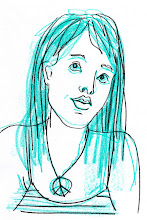This week I read Maison Ikkoku, which is a manga written and illustrated by Rumiko Takahashi. I have heard a lot of talk about manga comics in my life, mostly recently since I have been in this school. Basically I knew what to expect when I started reading this even though I was never really into them myself.
To me the images immediately let you know that’s it a manga just by the stylization if the facial features and somewhat in the text and speech bubbles. I wouldn’t be able to tell you if this is your typical manga story line or if they are commonly about romance but it seems to be.
Maison Ikkoku is a romantic story about the main character Yusaku and his infatuation with Kyoko who recently took over the job as the new landlord in the house where he is living. The story is as simple and easy to read, as it should be with slight ups and downs to keep you interested. Like most romance novels your following the life of in this case a young man and the struggles he encounters while trying to win the heart of who he sees to be the love of his life.
I would say I enjoyed this for what is was but I wouldn’t necessarily say I’m jumping off my seat to read the next volume. The illustrations were as interesting as the story it’s defiantly something I would suggest to a teenager.
